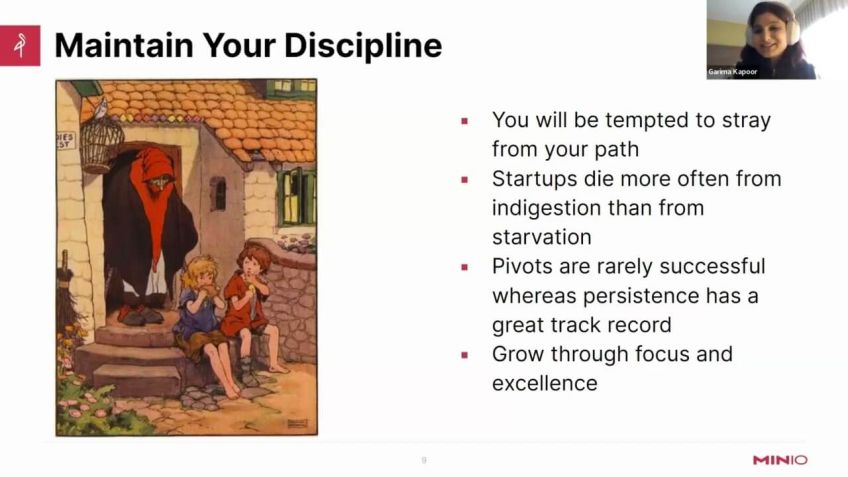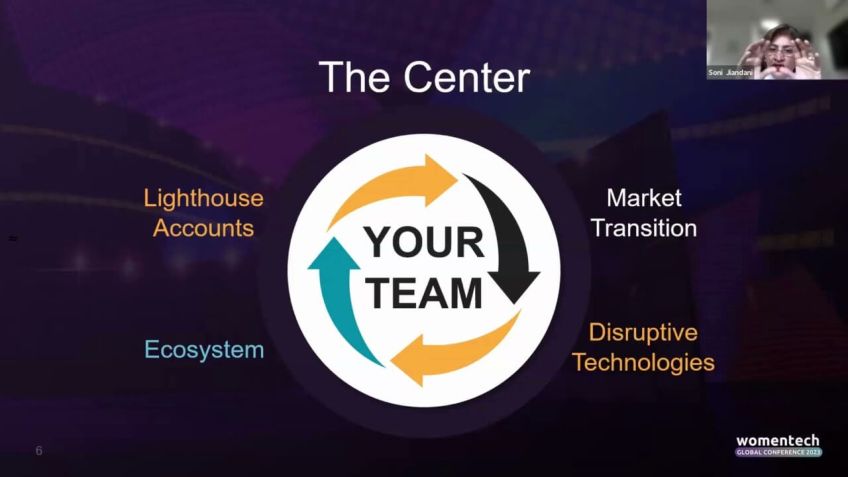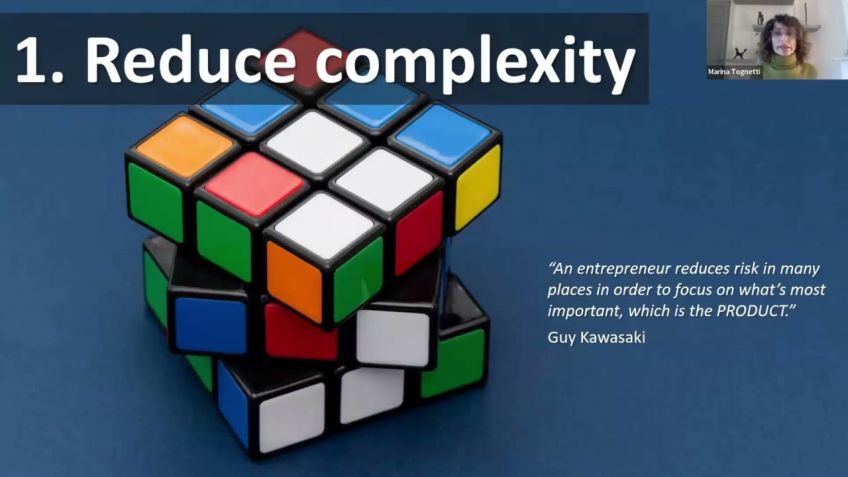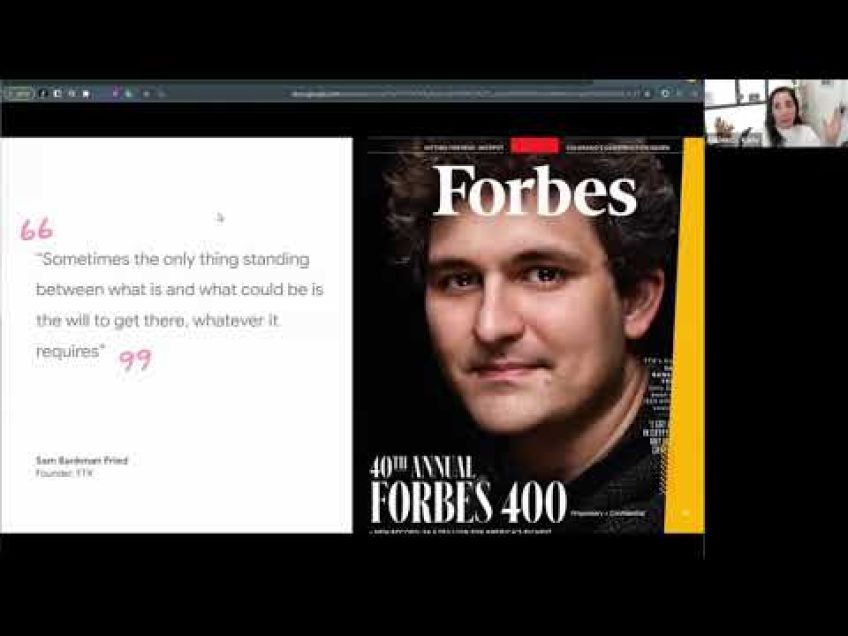From Latin America to Canada: An Entrepreneurship Story and Lessons Learned
Ingrid Polini
CEO at SafetyDocs GlobalFrom Corporate Jobs to Entrepreneurship: A Guided Journey
About the Speaker
About the Speaker
In this session, Ingri Pollini, CEO at Safety Dos Lobo and Safety Docs Brazil, shared her entrepreneurial journey. With extensive experiences ranging from General Electric to SAP, and even mentoring at the Accelerator Centre in Waterloo, Canada, Ingri brings a well-rounded viewpoint.
Ingri is also the co-chair of the Brazilian Canadian Chamber of Commerce, and host of the Find a Way podcast, focusing on the immigration stories of founders coming to North America.
Starting the Entrepreneurial Journey
Ingri kick-started her career with corporate jobs, showcasing her skills in large firms. However, her burning desire to make sweeping changes and build things quickly led her to entrepreneurship.
She emphasizes that you should never feel ashamed if you didn't initially pick entrepreneurship. Your skills and experiences can always be utilized and channelized towards it.
Inner Scorecard vs Outer Scorecard
Ingris encourages each of us to understand and define our inner and outer scorecards. An inner scorecard refers to personal goals and values, whereas an outer scorecard relates to societal validation and recognition. Your career and entrepreneurial decisions should align with what's important to you, providing the foundation for facing obstacles and possible rejections.
Embracing Failure and Strategizing Success
In the industrial world, failure is inevitable. However, entrepreneurs can adopt pragmatic approaches to handle it. Sometimes, projects fail, not because of your inefficiency, but because of market circumstances or other external factors.
When embracing failure, learn to expect it, analyze it, and derive learnings to avoid those pitfalls in the future.
The Power of Saying 'No'
One crucial skill that holds immense importance in entrepreneurship is the ability to say no. Not all projects and opportunities align with your goals, and time is a precious asset. Understanding when to refuse an offer, be it a speaking opportunity or a business proposal, is central to achieving focused success.
The Role of Mentors and Soundboards
Lastly, finding the right mentors or soundboards can exponentially expedite your entrepreneurial journey as these individuals can impart invaluable lessons from their experiences. Engaging with like-minded professionals in networking events or creating groups can be forms of gaining mentorship.
As you strive to move ahead, don't lose sight of your long-term goals. "Always look forward and remember what you're trying to achieve and don't get stuck in a day-to-day."
Ingri Pollini stands as a testament to the fact that perseverance, realistic optimism, and distinct perspectives can indeed carve the path for a successful entrepreneurial journey.
Questions or More Information
For further queries or to book a mentoring session with Ingri Pollini, follow the link provided.
Video Transcription
OK, I'll get started uh for those of us that are already here. Uh Welcome and thank you for joining me in this session. Um I will um let you know first and talk a little bit about me.So as you saw the name of my talk, I just want to share with you today lessons. I've learned along the way by being an entrepreneur in Brazil as well as in Canada. And um I just want to tell you a bit about me. So I'm Ingri Pollini, I'm the CEO at Safety Dos Lobo and Safety Docs, Brazil. I am also the co-chair of the Brazilian Canadian Chamber of Commerce. I'm a mentor at the Accelerator Center which is in Waterloo Canada and other programs. I also work as an advisor for a bunch of start ups. I have a master's inter communication. I'm a business consultant and speaker and I am also host uh at uh Find a Way podcast, which is a podcast that focus in giving immigrant founders a chance to tell their story and share the tips that they wish they learned before they immigrated to the to North America. So the first thing that I wanna tell you is a bit about my story. Um I've heard this more often than not that I always wanted to be an entrepreneur. I started very young. I always knew this was gonna be my path. Um But that wasn't my case.
So when I first started an entrepreneurship, I was working corporate jobs. I did um a bunch of stints in different large companies and uh doing my bachelor's in business. And with that, I never really felt like a fit in because I always wanted to build things faster and I wanted to make bigger change. So I got an opportunity. My co-founder came, came to me and said, like, look, I have this idea but I have no one to do it. So she didn't have a background in technology. Um I had the background because I worked at S API worked in General Electric. I worked at bus companies. Um and she wanted someone to bring the project to life that was safety docs. Um I wasn't sure that that's exactly what I wanted to do because I've entered the business world, decided to work in corporations, decided to work for those big companies. But I couldn't, has the opportunity to just get started on this and see where it took me. So while I was still doing one of my internships, I got um we started working in this project and we got our first client within like four months with the project ready and it was a big client. So it's kind of like, you know what this has been.
Um Like, I, we, we're building this, this happening and then I decided to leave my full time job, which was at a large company in order to dedicate myself to this project. I say this because sometimes um I feel like people are ashamed to say that they didn't take entrepreneurship as the first road or that they don't feel like they have as much as expertise as entrepreneurs because of that. But there's a lot of skills that can be used in entrepreneurship, even if you have 10, 10 years in the market even better because you know, a lot more than someone that might be just starting. So this is important because the path that I took wasn't exactly what I expected, but I've been here for 78 years now and um I continue to grow in this space and continue to do this. So the second point that I wanted to say after I told you a bit about my story and how we built it is talking about personally as professionals. What are your goals and what are your values? So more than just talking about entrepreneurship itself is talking about what exactly matters to you. So I really like this phrase. I know that Warren Buffett is a big name that a lot of people use in presentations.
But I, I really, really liked his biography and I think that this phrase represents a lot for me, which is the big question about how people behave is whether they've got an inner scorecard or outer scorecard. So he uses it as an example. If the world couldn't see your results, would you rather be thought of the world's greatest investor? But in reality, have the worst record or be thought as the world's worst investor when you are actually the best. So that dictates a lot, I know a lot of people like to think outward and I'm not saying one is better than the other, but um your decisions will and can be based on that based on what is important to you. For me, even though I do a lot of public speaking, I do a lot of consulting and all of that for me, I have my own personal goals that I wanna achieve and I have a very high bar for myself, but I don't necessarily care as much about the outer scorecard. If the outer scorecard is so important to you, you have to make decisions accordingly and that will change because um there's a lot of decisions if you decide to open a company or if you decide to change jobs or anything like that, that might not be supported by the people around you.
So you have to be prepared to deal with that and by dealing with that, especially for those of us that are entrepreneurs is a roller coaster and there's a lot of doubt and a lot, a lot of self doubt and a lot of issues that comes uh in terms of being an entrepreneur that you have to know where you like.
What's the important scorecard for you and how you wanna act towards that. The second point that I wanted to bring here is no matter how great your talent or efforts, some things just take time. I know this sounds a bit harsh, it might sound harsh for some people. Uh But I am more of a realist and I'm not here, I'm not here to tell you that if you hustle and you try very, very hard and you try everything you have, you will be successful. I can tell you that I failed in a lot of things and I succeeded in a lot of things. And with that, I learned that sometimes we fail and sometimes we are successful and that's just what happens. So does that mean that we shouldn't try? Not necessarily, but that does mean that we should keep in check in terms of, to know when our efforts are worth doing something and when it's not so many times people have an idea for a product or they have an idea for um a different project and they work on it for years. And I've seen this case more than once where like they, you know, build a product for two or three years, but they forgot to see if the market was willing to pay for that. So I've heard about project projects that, you know, the project was great, the product was great. The consumer would like to use it, but they wouldn't be willing to pay for it.
So with that, in terms, it comes with the reality check in terms of like you can work very hard on something, but also work smart, know where your talents are being used effectively and where you could be using them for something else and something just take time. Uh We, when we first started my company, my company has been bootstrapped to this day, which means for those of you that are not around the start up role, that means that we haven't taken outside investment. And that is because honestly, when I first started a company, there wasn't a lot of VC firms in Brazil, let alone that would invest in a woman in a male dominated field. So we did what we could do, right? Uh And we did the best we could with the money that we had and we struggled more than other companies that had taken millions in funding. But that also has its good sides in the sense that in the last couple of years, there was a lot of volatility in the market and that hasn't affected us. So learning that I think that when we enter linkedin, we enter all those platforms there's a lot to be said in terms of like, oh, this person is so successful, they talk about all their wins and all that.
Um But those wins that we see that snapshot of time doesn't talk about all the struggles that that person might have gone through. Uh One thing that I've learned a lot with our guests of the podcast. Yes. And if you hear the Find a Way podcast, you'll see this is that they say it's like, look, I failed two or three companies before getting this company that is quite successful right now. I didn't stop trying because I failed it. And I tried very hard, but that company just didn't work or it wasn't the right time in the market. And then I jumped into a project that I could think. I thought it was effective until I got the right one. So failing is something that is very hard and knowing when to put is something that is very hard. But knowing that when you put your talents and your efforts on everything that you've got some things just take time, then most things take time and it's not gonna be a success like this. Like it shows in social media or that we think that people just got successful out of nowhere. Um If you have questions, please post them.
Uh I think there might be a chat function or a Q and A function and I'll be happy to get to them at the end of the call. Um, this is, um, another good phrase that, um, from Warren Buffett as well. But I really like the analogy in here. So when we go in and, or a river or a pool, uh, you don't know how deep it is. You're not just gonna jump in. Usually people wouldn't just jump in, they're gonna kind of like, put 1 ft forward, try to see how deep it is. Try to like, you know, look around, see how they see if they like, you know, if they're gonna fall, if they will have to swim around because they can't reach it and all that. Um And that, that's within the same thing for business and within the same thing for um for work in general when we, I know again, um this might be a little bit conflicting advice from other mentors and I totally get it and I think people have different profiles and in the end you have to follow whatever works for you.
But in my view, uh caution is not necessarily bad. I know everyone talks about leaning in, you should lean in, give everything you got like, yes, but we all have responsibilities in our lives be what it may, it might be family, it might be uh kids, it might be, you know, your mortgage or whatever it is and that counts and you can test the market slowly.
So if you're thinking about doing the job, either be a new job, uh, consulting or a new company. You can talk about making the jump. But doing it is strategically that doesn't mean that you have to be afraid and it doesn't mean that you have to make fear, let fear stop you. But making sure that you're testing the waters, doing the asking the right questions and getting answers from the market before you leaning totally in something that, uh might not be effective. And that is basically just really like learning how to support yourself in those situations and teaching yourself to take the time to do the research and take the most strategic step. I know this is not a common advice, but um it's a little bit like the way that I think in terms of those things is a little bit different. So I talked to you a little bit about this um before, but I wanna go back to it because I think this is super important. So when we talk about failure, um a lot of people spend most of their life avoiding failure.
And I understand that failing is not nice. Failing is not pretty failing, doesn't get you the pauses, the lights, any like that, anything like that. But failure happens for every single one of us, be it a major or a minor failure. And the earlier that we learn to expect it, the better knowing that not every project is gonna work. Not every functionality is gonna be effective, not every job is gonna be the perfect fit for us. Um And I say this that even though we try our hardest, sometimes companies fail, sometimes uh the companies that we're working at fail and that might not have to do with you, not working hard enough, it might have to do with market circumstances. It might have to do with budget, it might have to do with many things that are out of our control and expecting failure is again, less about being pessimistic and more about embracing and looking at situations strategically and saying, look, could I have done better here? And if not, that's OK. But uh more than once, uh we got projects in my company where we thought we could do a feature and it was like, you know what, this is not gonna function the way that we have the platform right now. And that's OK or we tried in a way it didn't work. And we're like, OK, what can we learn from this experience? Was that something that we did? Was it something that they did? How can we develop this?
Um A lot of people beat themselves like down a lot when they fail. Um And I know this is part of human experience, we don't like experiencing this. But if you learn to, even if it's a couple months later, if that's what you can manage, look back and see, is there anything I would have done differently if I was in the same situation like I was before. And that is something that's very powerful. Um One of my last points here and um I wanna bring very uh broadly in terms of what we say. Yes or no. So when we talk about focus, um a lot of people think it's like, oh yeah, she's saying she's staying focused and just work 1214 hours every time, every hour that you can possible in order to make things work. And that's not exactly my point here. My point here is um we tend to accept every single opportunity that is put in front of us thinking that it will be helpful. I have a post it note right on, on the side of my computer here that reads, is this the right opportunity for me? Because one thing that I've noticed. So when I moved from Brazil to Canada, um I had no networking, I had no contacts.
I honestly didn't know anyone to the point that when I went to put my um my emergency contact for the insurance, I couldn't think of anyone in here and I had to put a number from Brazil, which they didn't accept and it was a whole thing. So I had to start slowly building my network and going to every single event and getting to know people fast forward. A couple of years later, I started getting invited to so many events and saying yes to so many things that I stopped doing. What was important for my company. It was important for my consulting business. It was important for the other side. So knowing when to say no and accept that people might get frustrated at you for saying no for opportunities or requests. It's harder than just saying yes to everything and thinking that you can handle it a lot of time. We just think that we own people or like, oh, this is a very good opportunity. I need to speak at this event. I need to go there and we spend a lot of resources and time going to those things that might not be the best, like the best thing for us right now. Um while your big projects on the back burner and you're using those events to procrastinate it. So taking a step back and asking yourself, is this the right opportunity for me? What are my goals for the next six months for the next year? And how does this opportunity impact those goals if I go to this three week conference or event?
Is that something that will bring me uh joy? Is that something that will help my business? Is that something that will help my career or the goals that I'm building or is that something that I just wanna do? And the answer can be the second and you can still go. But knowing when to say no is super important? And how to say no in a way that people understand. And I've refused a lot of speaking opportunities because it didn't fit my schedule and I couldn't move things around or simply because it was a time in my life that like, look, I need to focus on building the product or I need to focus on building this business strategy and I can't be bothered by speaking at specific things.
So I have times in the year that I don't accept speaking opportunities. I say this three months a year, I can't because I'm focused on something else. Usually people understand that and they become more understanding, but that comes to you understanding what are the opportunities that you would like to say yes or no before saying yes to everything, taking your time to think it through and seeing how that impact the rest of your opportunities.
One of the last steps that I wanna add here is finding soundboards um more often than not be it in as an entrepreneur or in business. We find things that we don't understand. Well, we might be asked in a specific project or we might be entering a market that's completely new to us. We might be working with an industry that is new to us. And with that comes a lot of doubt. Um the opportunity that finding soundboards creates is there's a lot of people out there and I'm not saying you have to find them like highest, like, you know, most expensive mentor to help you with this thing you can if you can afford to. But what I'm saying here is finding people that you can share that, understand where you're coming from, that understand your industry, that other entrepreneurs, if an entrepreneur or family and friends that understand you and what your next goals are, they can hear you and give you ideas or share their experience more often than not.
In the first couple of years of business, I would come in with a problem that I thought it was gigantic and I would come to my mentors like, I don't know what to do about this. And then they would be like, you know what Ingrid you can do, Xy and Z and that's what I do with a lot of the, the companies I mentor now and the founders I mentor now. It's like, oh, I have this big problem and I'm like, oh I've been there, done that. This is how I solved it or this is the things that you should watch. And that really, really creates a easy, like easier time dealing with those big projects. You can find those mentors in networking events. You can create groups of people if you're not an entrepreneur uh group from your industry. So like marketing professionals that you believe and you like that, you can share honestly about your problems and you can share with them what your next steps are and then they can bring you feedback. So getting to the end here, um I'm just saying, always look forward and remember what you're trying to achieve and don't get stuck on a day to day more often than not, we focus on the day to day on the little tasks that will bring not so much like not, not bring us forward as much.
So making sure that you're adding enough of those big tasks that will propel you forward towards your goal. Your one year, five year, 10 year goal is very important. Don't get stuck on just being reactive about your email, your calendar, your events and start being proactive about what are the things that you have to do in order to reach the next goal that you're setting? Um And just ending here is when you work really hard, you start getting lucky. Um I'll just leave a Q and A now and you can book a mentorship session with me if you want. Um Here's the link, you can just uh open my landline and yeah. Um I'm here for any questions you may have.






